Introducing Syrian Rue (Peganum Harmala) – Whole Seeds from Morocco!
Excellent quality viable Syrian Rue (Peganum Harmala) seeds, collected from the wild in Morocco. They have been carefully sieved to remove all dust and soil. Peganum Harmala is a member of the Zygophyllaceae (Caltrop family). Native to the deserts of India, it’s habitat stretches through the Gobi desert into the former Soviet Union and to all Mediterranean country’s and central Asia.
Syrian Rue, also known as Peganum Harmala, is a unique and versatile plant that has been valued for centuries for a variety of uses from medicinal and spiritual to more practical such as natural dye. The seeds and wood has been used in ritual burning for cleaning, later more about this interesting ritual. Our Whole Seeds are sourced directly from Morocco where the plant has been used for centuries.
These seeds are carefully sourced and selected to ensure the highest quality. They are rich in alkaloids, particularly harmine and harmaline, which are known for their psychoactive and therapeutic effects. Syrian Rue has been traditionally used for its potential to enhance spiritual experiences, induce vivid dreams, and promote relaxation.
In addition to its spiritual uses, Syrian Rue is also valued for its medicinal properties. It has been used in traditional medicine to treat various conditions, including digestive disorders, respiratory ailments, and skin conditions. The seeds can be prepared as a tea, tincture, or incorporated into various herbal formulations.
The ritual burning of Syrian Rue
The ritual burning of Syrian Rue holds profound significance in certain cultural and spiritual practices, particularly among indigenous communities of the Middle East and Central Asia. This ritual, known by various names such as “Esfand” or “Aspand,” involves the burning of dried Syrian Rue seeds or plant material as a form of purification, protection, and spiritual invocation.
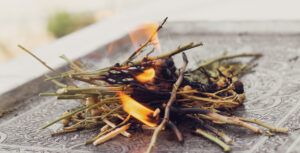
The process typically begins by gathering bundles of dried Syrian Rue seeds or branches, which are then ceremonially prepared for burning. Often, prayers or invocations may accompany the ritual, invoking blessings, protection, or divine guidance. The dried plant material is then ignited, releasing fragrant smoke that fills the surrounding space.
The smoke produced by burning Syrian Rue is believed to possess purifying and cleansing properties, capable of dispelling negative energies, warding off malevolent forces, and promoting spiritual clarity. As the smoke rises, it is thought to carry prayers and intentions heavenward, forging a connection between the earthly realm and the divine.
The ritual burning of Syrian Rue is often performed during significant life events, such as births, weddings, or funerals, as well as during times of transition or spiritual seeking. It serves as a potent symbol of renewal, transformation, and spiritual renewal, fostering a sense of harmony and balance within the individual and the community.
Throughout history, the ritual burning of Syrian Rue has been intertwined with cultural traditions, folk beliefs, and spiritual practices, preserving ancient wisdom and fostering a deep reverence for the natural world. As participants engage in this sacred act, they honor the interconnectedness of all living beings and the timeless cycles of life, death, and rebirth.
Syrian Rue other names
Syrian Rue, scientifically known as Peganum harmala, is also referred to by several other names across different regions and cultures. Some of the alternative names for Syrian Rue include:
- Harmal
- African Rue
- Wild Rue
- Esfand
- Harmel
- Isband
- Aspand
- Tanaruz
- Khormali
- Khorma
- Umm Al-Qura
- Haramein
- Yuzarlik
These names reflect the plant’s widespread distribution and its cultural significance across various regions, from the Middle East to North Africa and beyond. Each name carries its own linguistic and cultural nuances, reflecting the diverse contexts in which Syrian Rue is revered and utilized.
How to grow Syrian Rue?
Growing from a perennial woody rootstock, Peganum Harmala is a bright-green, densely foliaged, herbaceous succulent. Although its smooth many-branched stems may have a spread of 120 cm or more, the plant is rarely over 60cm tall and generally appears round and bushy in habit. Its leaves are 6cm long, born singly and finely divided into long narrow segments. Each year between June and August, It produces many single white conspicuous flowers. Measuring 2 to 4 cm across, these blooms have five oblong-elliptic petals as well as five narrow sepals of slightly longer length. Each flower has the potential to develop into a fruit. A leathery, three valved seed capsule stands erect on its stalk, each capsule measuring about 1cm in diameter and containing more than fifty dark-brown, angular seeds.
Cultivation is easy. Sow seed in very sandy soil. Provide shade for the first year, then plant out in sunny, dry location. It will tolerate freezing and wet conditions. Space plants minimal 50 cm apart.

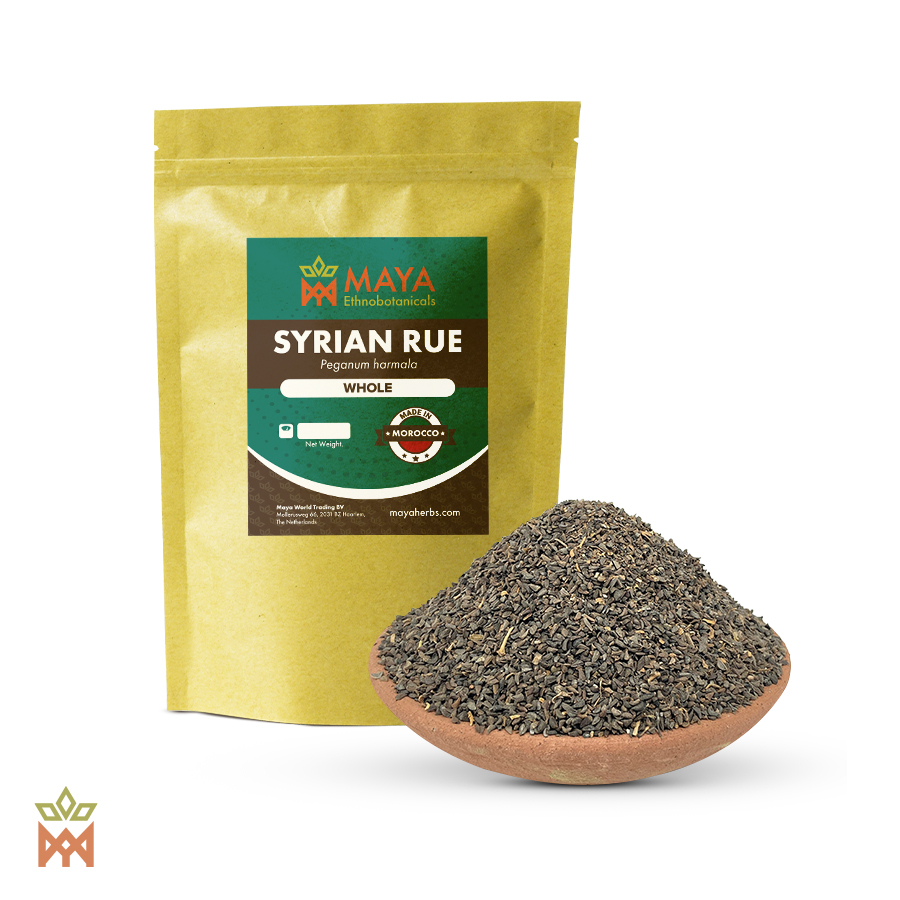

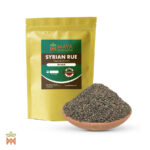
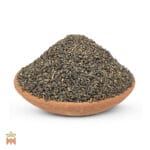

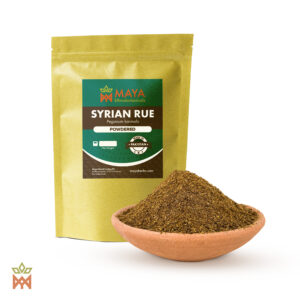
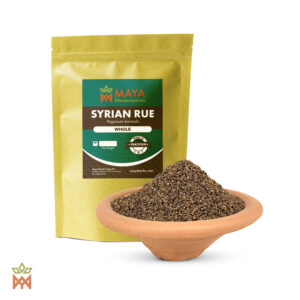
Andrej (verified owner) –
Syrian Rue differs according to regions just as Caapi does.
Seeds from Pakistan tend to be more harsh and direct.
Iranian seeds are very spiritual and deep.
These Moroccan ones are somewhere in between with a mellow and “sandy” vibe.
They make a very cleansing and healing incense with palo santo (50/50). Cheers!